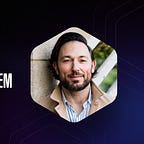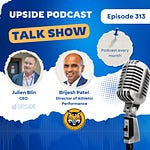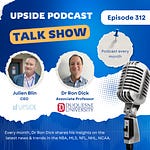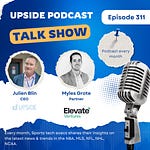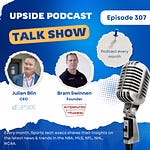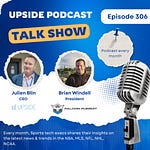Today we have the honor of interviewing Mitch Heath, Co- Founder of Teamworks, the leading operating system for sports.
Teamworks will be exhibiting and speaking at our NY Sports Tech Summit at Citi Field on November 15. If you are attending the event, set up a meeting to connect with Teamworks.
Teamworks is the proven operating system for high performance, powering more than 7,000 sports, military, and public safety organizations around the world. Available on a centralized and integrated platform, the Teamworks’ product suite provides specialized applications to support recruiting, development, management, individual branding, and community building.
Based in Durham, North Carolina, and founded in 2006, Teamworks continues to expand its global presence with employees across ten countries and offices in London, England, and Brisbane, Australia.
Teamworks now works with 7,000+ teams globally, including the majority of the teams (NBA, MLB, NFL, MLS, NCAA..) in North America.
📝Show Notes: Through this interview, we touched on his background, and his company and product. We also discussed the benefits for sports organizations and athletes to use their product. Lastly we talked about their competitive advantage, business model and plans for the next 12 months.
Best Quotes: Here’s some of the key discussion points and best quotes from our conversation with Mitch:
On his background and how he got the idea of launching Teamworks:
“ I am American by birth. I grew up in Virginia, and came down to school in North Carolina. And this is where the origin story of Teamworks began. So we started Teamworks out of Duke University really with a simple idea. We looked at Duke's teams, particularly Duke's football team, and saw that they'd recruited players”.
“And they had hired tons of experts, spent millions of dollars hiring coaches or scientists, medical professionals, tutors, sports psychologists, and so on, to support those athletes. But there were no systems in place for those experts to work together. No common communication, no common workflow. They were all operating in their own departmental silos. And that caused communication breakdowns, that caused operational inefficiencies, and ultimately that caused unnecessary distraction and stress on the players”.
“We wanted them to be focused on performing. And so we started with the simple idea of, we've got to connect the sporting organization better than it currently is. It didn't take us long to figure out that if Duke had those problems, there were probably some other teams. All around the world, we've had the same problems”.
On the fact that Teamworks now works with 7,000+ teams globally and the majority of the teams (NBA, MLB, NFL, MLS, NCAA..) in North America:
“We launched the business in 2010. We grew very quickly in the collegiate space in the U. S. By 2014 it had entered the pro space, so started in the NFL, MLB, NBA, so on. And now we work with the majority of those teams in North America”.
“In terms of our client base, we serve over 7,000 teams at this point across the collegiate space, professional sports on just about every continent”.
On the fact that departments and employees of teams tend to work in their own lane and that there is a silo problem around tech and data:
“One you have the silo problem. In terms of people, everybody is working in their own lane, not necessarily collaborating, communicating, and then you also have a silo problem around tech and data. And that's really where we are in sports today, where entrepreneurs have come up with great ideas. That's a good thing. New technologies have entered the space. New innovation has been applied. Teams have been consuming technology at an accelerating rate. That's all positive progress”.
“But the result of that is we now have data in the sports performance system that doesn't talk to data in the medical system that doesn't talk to our data set around hydration around mental health around nutrition and what's happened in every other industry when we get to this point and operating system comes in and starts to stitch all this together and says we can't have 30 different fragmented vendors in our tech stack. It's time for an integrated solution. And that's really where sports is now. And that's what Teamworks is set out to do”.
On the fact that teams typically use 20 to 30 different vendors which creates challenges for athletes and teams as they are using their own software and that operate differently:
“We typically see at least 20 different tech products or vendors on the team side alone, let alone the commercial side. There's a whole other ecosystem surrounding the fan, but just surrounding the athlete. There are 20 to 30 different vendors (wearable technology, GPS, HR/cardio..) in play at any given point”.
“And they have their own software like for GPS, for cardio, for AMS. And they all operate differently. And some integrate better than others. Some share data better than others, but the teams are often left to pick up the pieces and figure out how to match all this together. And that presents a business challenge for the teams to have different vendors. They've got to negotiate different rates”.
“So we want to solve the challenge faced by the athletes. Athletes should not have 15 different apps on their phone for their athletic life. They should not be logging into a number of different platforms. They shouldn't have a totally different UI experience in every tool that they use. And so just from the athlete's perspective alone, it's time for the industry to start streamlining”.
On their M&A strategy and the fact that they are an ecosystem of products:
“Teamworks is a true operating system. So what we've done is said, let's look at the landscape of tech that surrounds players. And again we don't touch the fan side. There's a whole other landscape over there, but what touches our players day to day and that encompasses performance tech that encompasses medical tech, nutrition, operations, branding NIL for our collegiate athletes”.
“We've looked at what are the best tools on the market in those categories and said, if there's not a great tool available, we should probably build it. If there is an entrepreneur who's brought a great product to market, we want to acquire it or partner with it. So in stitching all that together, I say.. we're not one product. We are an ecosystem of products that make up the backbone of a team's tech stack”.
On the benefits for teams to use Teamworks:
“So first and foremost, we want to eliminate all the redundant tasks. Second we want to create a centralized experience for players and staff and a centralized integrated tech stack and that's really when you think about: What are we doing for this industry? Where are we leading this industry? That's it”.
“We are taking an industry that has been historically extremely fragmented, incredibly siloed and stitching it together into one operating system led model, as you've seen in healthcare and banking and construction and other industries. Sports is a little bit behind those industries in this tech journey, but it's, it's catching up incredibly quickly. And we want to lead that charge”.
On their competitive advantages:
“I think there are two kind of areas where we think about competition.
We think about, in the big picture, that we are competing against the status quo or competing against, mashing together of a number of disparate solutions and a number of point solutions, and we think there the advantage is pretty clear, which is moving the industry towards a centralized, smoother experience, which brings prices down for consumer or teams in this case, but also just enhances the our mission is to serve the athlete”.
“We want to enhance the athlete experience. That's what we'll do when you think about the individual product line level. When you think about our ecosystem, it's made up of products in a number of categories. And so those products do have to compete against point solutions in those categories. So Notemeal is the leader in athlete nutrition, but there are other entrepreneurs trying to do good work in the nutrition space”.
“And Notemeal has its set of differentiators and all the reasons why a team would choose Notemeal over any other nutrition tool on the market. We think about that in each of our categories”.
On the fact that Teamworks offers flexible options for teams to integrate with their existing vendors:
“And if you have, let's say a team or national team that say, look, I'm already using an AMS platform, but I would love to use our communication platform, we are flexible in that way too. That happens all the time. We offer an elite bundle, which means all of our products are centralized, integrated in one bundle”.
“And we have a number of teams that will jump straight to that. But when I first meet a team, I advise them not to think about buying everything all at once because it's a lot to consume”.
On their business model:
“So we're a vertical SaaS company, which means we deliver software across thousands of clients with a degree of configuration and customizability for each client. But from an investment perspective, it's an annual license, and a pretty traditional SaaS delivery”.
On their plans for the next 12 months:
“We've got a lot on tap from a product perspective. You're going to continue to see us double down on integrations. You'll continue to see announcements about the acquisitions we've made being more fully integrated into the ecosystem”.
“And you will see more acquisition and partnership announcements. We're going to continue to build out the ecosystem with the best products on the market from a market perspective, we're continuing to grow. We have a lot more work to do in Europe. We're excited about that. Cricket is a big frontier for us”.
“You're going to see us active in India. You'll see us active in South Africa. So those are 2 regional territories that we're excited to spin up. And then outside of individual sports, it's just about going deeper in every market. And it's about saying, okay, Hey, in the NFL, we work with all but four teams at this point, but as we bring new products into the ecosystem, or we partner with existing products on the market, how do we accelerate our pace in bringing those to the entire NFL to the entire NBA and NHL, so on”.
“So in the markets where we're already deeply penetrated and have deep relationships with the clubs, now it's about how do we advise them on their tech strategy and bring those best of class products to them. So that's a lot of the conversations I'm having now with CEOs, CTOs, GMs, sporting directors is, let's talk about your five year vision. Let's talk about your ten year vision. It's not about, hey, buy this product now to solve this one minor problem. It's about let's build your tech strategy and let's think about what's coming”.
On the best way to reach out to Teamworks:
“So teamworks.com has all the information on us as a company and the products that we brought to market. Individually I'm on LinkedIn, where I am frequently posting there about trends in sports, tech trends in sports in general, so feel free to follow me there or reach out directly”.
You may also like:

